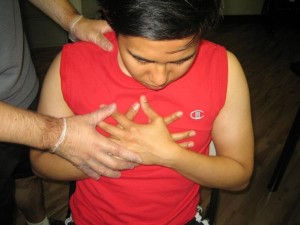With the statistics on heart disease getting worse and worse each year, the risk for heart attacks is getting higher and higher. CPR is one of the most important lifesaving skills everyone should have – whether you work in health care or not, because it can help save the life of a person who just had a heart attack. There are a variety of programs to choose from at San Francisco CPR; we even offer re-certification classes for rescuers who need to renew expiring certificates. First aid is also an important component of all our CPR training classes.
A look into hypertension

Hypertension is one of the most dangerous complications of heart disease. When our vessels become blocked with fat (plaque deposits), it increases the overall systemic resistence in the body. In order to overcome this, the heart beats with much more force, increasing our blood pressure. When blood pressure gets too high – called a hypertensive event – the vessels can rupture or the heart can stop beating.
Hypertension is a disease where blood pressure is consistently high, greatly affecting our cardiovascular system. According to the Center for Disease Control, one in three Americans have high blood pressure – that’s 67 million Americans. Only half of these people have controlled hypertension. Almost 1,000 deaths every day included hypertension as a factor in their death. People should be more aware of these facts and take the necessary action to prevent cardiac disease and its complications.
Enrollment
Decided that you need CPR training? We have five training programs and three re-certification classes through the week. They are all very affordable, offered at the most competitive rates in the city. Because we want to make our programs more accessible to a wider range of students, there are several ways to enroll for them: e-mail, telephone call, website, or in person. If you visit the San Francisco CPR website, there is an application form available 24/7.
Training
CPR is performed in two levels, basic and advanced. Basic CPR is given before medical management, usually by bystanders and EMTs. Advanced management is done in a hospital setting, like the ER, with complete medical equipment, medication, and health care professionals. We also divided our programs in the same levels, basic and advanced CPR training.
We only have one program for the public, the rest are for health care providers.
- Heartsaver CPR – Basic Life Support – general public program, 4 hrs.
- Heartsaver CPR – Basic Life Support – 4.5 hrs.
- *Basic Life Support for HCPs – 4.5 hrs.
- *Advanced Cardiac Life Support – Advanced Life Support – 16 hrs.
- *Pediatric Advanced Life Support – Advanced Life Support – 14 hrs.
Our re-certification classes are available for three of the programs above (programs with asterisks). CPR rescuers who have previously trained in CPR but their certificates are nearing expiry can renew through a re-certification class. However, remember to renew before the expiration date. We do not accept rescuers with expired credentials in our re-certification classes.
